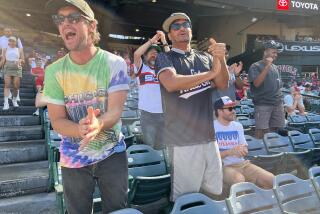Scioscia defends trying Game 4 suicide squeeze
- Share via
Still feeling the squeeze of criticism two days after the Angels’ season came to an abrupt and painful end, Manager Mike Scioscia on Wednesday vigorously defended his decision to try what some viewed as an unnecessary gamble in the ninth inning of Game 4 of the American League division series.
With the potential go-ahead run at third base and one out, Scioscia had Erick Aybar, one of his team’s best bunters, attempt a suicide squeeze. Aybar couldn’t connect on Boston reliever Manny Delcarmen’s 2-and-0 pitch, and catcher Jason Varitek tagged out Reggie Willits as the pinch-runner retreated toward third base.
Aybar grounded out and the Red Sox scored the series-clinching run in the bottom of the inning, triggering a torrent of outrage among Angels fans who thought their manager should have tried a more conservative approach given the circumstances.
“If you’re afraid of the downside of any situation, you’re never going to achieve,” Scioscia said. “I thought it was our best chance right there to get that run in and get this game to Frankie [Rodriguez] in the bottom of the ninth. . . . There was a very high probability that that ball was going to be put down to where Reggie walks home. That was the basis of my decision.
“It was an extremely high-percentage play given the count, the guy that was on base and the guy that was in the batter’s box. And I’ll tell you what, if it happens again, we’re doing it again and Erick’s getting that bunt down. I can guarantee you that.”
Scioscia said Aybar, who led the team with nine sacrifice bunts, was taking his inability to execute one at a crucial time extremely hard.
“A lot of focus is on that one play, and certainly we’re not putting that play on Erick because we’re not where we are if that kid didn’t do what he did all summer before he got hurt” in August with a hamstring injury, Scioscia said. “This guy played better shortstop than anyone in our league.”
The notion that the suicide squeeze was a bad call because Boston had anticipated it, Scioscia said, would only be valid if the Red Sox “had pitched out twice and caught us.”
Scioscia said had the count been 2-and-1, he wouldn’t have called the squeeze because the probability of a pitchout or a difficult-to-hit pitch increased.
Scioscia has been criticized for previous playoff moves, including the decision to bring starter Jarrod Washburn out of the bullpen to pitch to Boston’s David Ortiz in Game 3 of the 2004 AL division series. Ortiz hit a walk-off homer to secure a Red Sox sweep.
But Scioscia repeatedly said he was “very comfortable” with the play that backfired Monday.
“If it wasn’t part of Erick’s game or Reggie’s game or the situation at the time, it would make it a much tougher thing to live with,” he said. “And this page is heavy, let me tell you. It’s not heavy for the fact that the decision didn’t work out; what’s heavy is the fact that it was a series that we did not play as well as we needed to, and I’ll take responsibility for that.”
The Angels’ inability to hit with runners in scoring position, execute timely sacrifices or advance runners safely from first to third on singles -- facets the team typically excelled at during the regular season -- contributed to the playoff exit of a team that set a franchise record with 100 regular-season victories and was a fashionable World Series pick.
And so the Angels will hope for a better fate in 2009 after losing in the first round in three of their last four postseason appearances.
“I’m extremely disappointed at the last couple of go-rounds we’ve had in the playoffs,” Scioscia said. “But we’re going to get better and we’re going to get there. I’m as confident with that as anything that I could even think about.”
John Lackey was also skewered by fans after the series for becoming visibly upset on the mound after his teammates made defensive mistakes and then appearing to whine in the clubhouse about how the Angels lost to an inferior team.
“John is an emotional guy that is probably as good a teammate in this clubhouse as anybody that’s been here,” Scioscia said. “He’s pulling for guys, behind guys, wanting guys to achieve. At times during a game, he shows some emotion out there.”
But Scioscia said Lackey’s teammates understand that his words and actions are rooted in his competitiveness and desire to succeed.
--
More to Read
Go beyond the scoreboard
Get the latest on L.A.'s teams in the daily Sports Report newsletter.
You may occasionally receive promotional content from the Los Angeles Times.







